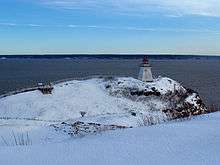Cape Enrage
Cape Enrage is the name given to the southern tip of Barn Marsh Island, an island located in Albert County, New Brunswick, roughly half way along the coastline between the villages of Riverside-Albert and Alma at the eastern entrance to Fundy National Park.
Accessible from Route 915, the island itself is surrounded by jagged sea cliffs that are often more than 50 metres (145 ft) high, and is separated from the mainland by a narrow tidal creek.
Cape Enrage derives its name from the large reef that extends south into Chignecto Bay, which causes the water off the point to become extremely violent, particularly at half tide when the reef is partially exposed and the water is moving quickly.
Cape Enrage Lighthouse
 Cape Enrage Lighthouse in panorama | |
 New Brunswick | |
| Location |
Barn Marsh Island County Albert Canada |
|---|---|
| Coordinates | 45°35′38″N 64°46′48″W / 45.593969°N 64.779956°WCoordinates: 45°35′38″N 64°46′48″W / 45.593969°N 64.779956°W |
| Year first constructed | 1838 (first) |
| Year first lit | 1870 (current) |
| Construction | wooden tower |
| Tower shape | square frustum tower with balcony and lantern |
| Markings / pattern | white tower, red lantern and rail |
| Height | 9 metres (30 ft) |
| Focal height | 38 metres (125 ft) |
| Characteristic | Fl G 6s. |
| Admiralty number | H4060 |
| CHS number | CCG 157 |
| NGA number | 11064 |
| ARLHS number | CAN-096 |
| Managing agent | Cape Enragé Adventure Centre[1] |
The oldest lighthouse on the New Brunswick mainland, dating from 1838, is located at Cape Enrage. The lighthouse itself has been automated and unmanned since the 1980s, but it has recently become a popular tourist destination, as a result of a concentrated effort by local students to renovate the property and run it as a summer project. In 2004, Frommer's travel guide listed it as one of the 'Best Views in Canada'.

Acadian sailors made early mention of 'Cap Enragé,' and after the Acadian expulsion, British settlers anglicised the name to Cape Enrage. During the 1840s, Cape Enrage won a contested debate as the location of the first lighthouse in Chignecto Bay, and the lighthouse was erected in 1847. A variety of boathouses and temporary lighthouse keeper's houses were built over the next decades, but were frequently damaged or destroyed in the region's numerous storms and harsh winters. The lighthouse itself was heavily damaged in one storm in the 1840s, and was extensively repaired. The current lighthouse keeper's house dates from 1952.
The lighthouse was automated in the late 1980s by the Canadian Coast Guard, and the last lighthouse keeper, Noel Justison, left the property in 1988. The property quickly began to suffer from neglect and vandalism, and by 1993 all of the buildings except the lighthouse were scheduled for demolition by the government. However, in 1993 a small group of high school students from Moncton, under the supervision of Dennison Tate, their physics teacher, began a restoration project at the site, renovating all of the buildings and slowly turning the site into a tourist destination. From 1993 to 2009 Cape Enrage Interpretive Centre, a not-for-profit, student-run organisation, maintained the property and the students also offered climbing, rappelling, and kayaking in the summer months through the for-profit business, Cape Enrage Adventures. In 1995 the keepers house transferred from the Canadian Coast Guard to Province of New Brunswick along with 4+ acres of land. In the summer of 2004 the Canadian Coast Guard formally transferred ownership of the lighthouse to Cape Enrage Adventures and Cape Enrage Interpretive Centre.
See also
References
- ↑ Rowlett, Russ. "Lighthouses of Southern New Brunswick". The Lighthouse Directory. University of North Carolina at Chapel Hill. Retrieved December 28, 2015.
External links
| Wikimedia Commons has media related to Cape Enrage Lighthouse. |
- Aids to Navigation Canadian Coast Guard
- aerial view
- Official website
- Article on 'The Best View in Canada"
- Cape Enrage Light House History